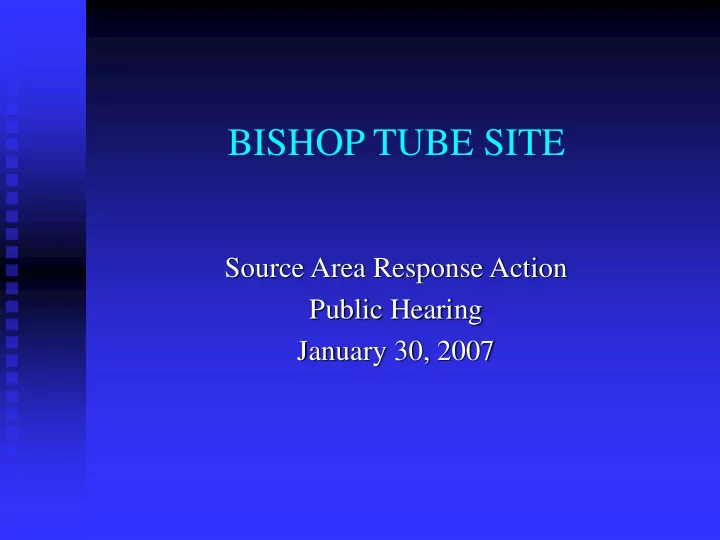

BISHOP TUBE SITE Source Area Response Action Public Hearing January 30, 2007
BISHOP TUBE SITE Site Background/History DEP Involvement DEP Findings DEP Response Action Long-Term Plans
Site Location
Bishop Tube Site - Aerial View
Operations History 1950s - J. Bishop Precious Metals Tube Milling and Manufacturing 1960s – 1990s Matthey Bishop, Whittaker Corp., Christiana Metals & Alloy Steel Stainless Steel Tubing 1990s – Marcegaglia, USA Updated Manufacturing Process – stainless tubing
Stainless Steel Tube Manufacturing Process Cold re-draw mill process involved repeatedly lubricating tubing, drawing tubes through smaller die to achieve smaller diameters. After each draw degreaser is used to remove lubricants prior to physical and chemical treatment to smooth or de-burr the external surfaces.
Chemicals Involved Welding gases Lubricating oils Chlorinated Solvents (Trichloroethene, Tetrachloroethene, & 1,1,1 – Trichloroethane) Pickling Liquor (Strong Acids: Hydrofluoric acid & Nitric acid)
DEP Involvement Early 1970s - discovered releases to Little Valley Creek from waste acid (pickle liquor) lagoon 1980s - Groundwater contamination discovered (fluoride initially, later chlorinated degreasers)
DEP Involvement (cont’d) 1980s – 1990s - Voluntary actions by Christiana Metals to study contamination 1990s - Treatment system installed on off-site domestic well by Christiana Metals 1999 - Site abandoned by Christiana Metals and HSCA Further Investigation began.
DEP Involvement (cont’d) Hazardous Sites Cleanup Program – Further Investigation Soil Groundwater (shallow & deep) Surface water (Little Valley Creek)
Soil Sampling
Well Drilling
Well Sampling
Stream Sampling
DEP Findings Onsite groundwater contaminated by TCE and other chlorinated solvents Deep (>200 ft) and shallow (<20 ft) Evidence of free product (DNAPL) Migration off-site confirmed – Bedrock geology increases complexity Onsite stream discharge of contaminated groundwater.
DEP Findings (cont’d) Off-site groundwater contamination One domestic well is contaminated (equipped with treatment) Modeling suggests discharge to Little Valley Creek far downstream Stream sampling seems to verify the model Full extent of the contamination is not known
DEP Findings (cont’d) Three source areas identified during soil investigations Sources are consistent with manufacturing, solvent storage and waste handling areas Sources continue to contribute to groundwater contamination Potential for indoor air contamination due to soil and shallow groundwater contamination
Source Areas/Hot Spots
DEP Response Action Cleanup of soil and shallow groundwater in the three source areas coordinated with the new property owner/developer Developer agreed to address soil in the areas as part of the purchase from the industrial development authority Plant #8 Area is primarily a shallow groundwater problem
DEP Response Action (cont’d) DEP considered taking no action to address groundwater at this time, and concluded: Continued source of groundwater contamination Delay in action stops redevelopment plans Cooperative action is more cost effective and efficient
DEP Response Action Response involves coordinating actions on both soil and groundwater in the three source areas Treatment using Soil Vapor Extraction & Air Sparging technology Flexibility to supplement or change approach
Soil Vapor Extraction/Air Sparging Treatment Shed Ground Surface Water Table Bedrock
Pilot Test Vapor Barrier
DEP Response Action (cont’d) Special Conditions for Response Action Need for a vapor barrier to prevent indoor air contamination Must allow for the use of the site while the system is working Flexibility to change approach if system does not operate adequately Injection of chemical or biological amendments to destroy contaminants Introduction of heat or steam to destroy contaminants
Long-Term Plans Complete evaluation of the stream impact (on site) Evaluate options for cleanup (including another chance for community input) Develop a plan for studying off-site groundwater contamination and assessing associated risks Continue to seek the involvement of Potentially Responsible Parties in the Cleanup Actions Additional phases of cleanup action
Questions? ?
Contact Information Dustin A. Armstrong PA Department of Environmental Protection 2 East Main Street Norristown, PA 19401 Phone: (484)250-5723 Written Comment Deadline: March 16, 2007
Recommend
More recommend